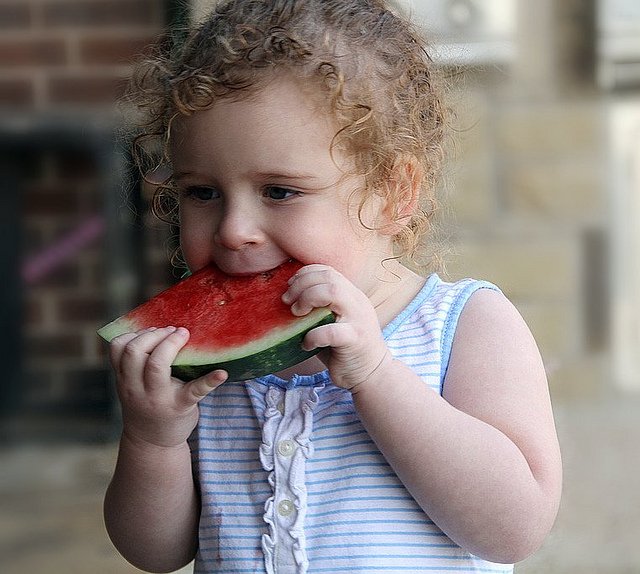
When I was growing up, watermelon meant a lot.
It meant that it was summer, that school was going to be out soon, that we’d be going to the beach to have picnics, that we’d be sitting outside on the porch and letting the watermelon juices run down our arms and that we could have spitting contests with our cousins.
“You kids spit the seeds out on the grass,” our mothers would say. “Not at each other.”
Watermelon doesn’t have any meaning these days other than being a bland, tasteless, blob of rubbery pink that the restaurants absentmindedly add to your plate as a “garnish.” It isn’t even the deep, “watermelon red” Crayola color it used to be.
Today, watermelon is boring.
Seventy years ago, in those original days of eating what was in season instead of what had been flown in by jet from the other side of the world, watermelon was far from boring—it was exciting. Just like other fruits and vegetables of the eating-food-from-the farm-around-the-corner days, you could keep track of the seasons by what you saw in the produce section or by what the vegetable man brought in his beat up old pickup truck.
I remember waiting and waiting for the watermelon to show up and by the time it did, I could virtually taste it before we cut into it.
As the years went by and I started to see watermelons in the grocery stores when it wasn’t summer I thought something was off. It actually gave me a kind of sinking feeling inside. Like I’d lost something.
You can’t eat watermelon when kids are in school or when it’s too cold to have picnics or when you can’t go to the beach, I thought.
I recently went to the Middle Eastern Market to buy a leg of lamb for dinner. I went there because the Halal cured lamb is the absolutely best lamb I have ever tasted.
“Oh no, ma’am, I’m very sorry,” the man behind the counter said. “But we don’t sell lamb until Springtime. This is not Springtime.”
I’d forgotten that lamb actually had a “season.” In fact, I’d forgotten that was why Leg of Lamb was thought of as Easter Dinner—because both the lamb and Easter were harbingers of Spring.
Recently I thought about what all the having-it-now that I have gotten used to has cost me.
- It has cost me the feeling of satisfaction that comes with finally having something that I had waited for.
- It has cost me the deliciousness that only rarity could bring.
- It has cost me the awareness that food is more than just fuel for my body, and that it is also a messenger of the seasons.
- It has also cost me my childhood memories that are associated with the first sight of watermelon in the market.
In the end, it seems to me that, while the food production industry has gained much by their year-round supply-chain availability of food we, as individual consumers, have lost far more than we have gained.
Rather than seeing the year-round, ubiquitous watermelon, limply waiting on a dinner plate to be noticed, I’d prefer to sit on the back porch once a year—in the summer—with deep red watermelon juice running down my arm, waging a seed-spitting contest with my cousins.
~
Author: Carmelene Siani
Editor: Travis May
Photo: Flickr/Igal Avshman






Read 2 comments and reply